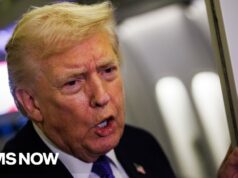It’s been an intense week of haggling for Mexico, the United States and Canada over the 24-year-old North Atlantic Free Trade Agreement (NAFTA). But US President Donald Trump seemed willing to leave Canada out of a final deal to rework the regional trade pact, and replace the three-nation NAFTA with a bilateral trade agreement with Mexico.
On Friday, Trump notified Congress of his plans to sign an agreement with Mexico in 90 days to replace NAFTA, before President Enrique Pena Nieto leaves office December 1.
And despite earlier suggestions that he may cut Canada out of the agreement altogether, Trump is hoping Ottawa can be brought on board, too. Talks to keep Canada in the bloc broke up on Friday but are expected to resume next week.
“The updated NAFTA agreement, especially the US-Mexican deal will be supported by business for almost the relief it gives because the uncertainty was killing investment plans,” according to Simon Evenett from St Gallen University in Switzerland.
“As for public support for this, I expect it will be much greater in the steel sector and in the car sector in the United States where those industries are well represented like Michigan.”
“The new NAFTA deal is actually a very small modification of the old NAFTA deal – it’s been dressed up to look like a big deal for political reasons and this is one of the reasons why the business community will be so relieved to see that there won’t be too much disruption to their supply chains,” explains Evenett.
“There’s enough meat in here which has been given to the trade unions, however, that they will be supportive of this deal when it goes before Congress.”
The negotiation tactics of the Trump administration is “a classic power play,” says Evenett.
“They’ve essentially divided Canada and Mexico. Mexico needed to have a deal quickly before their president leaves office and that required signature by the end of this week and the deal was done with the Canadians outside of the room … Canada desperately wants to retain its membership in NAFTA and will come under enormous pressure this week to make concessions to the Americans in the areas of dairy products and investment disputes.”
Trump’s bilateral deal with Mexico is “like the renegotiation of the Korean trade agreement”, points out Evenett. “These are deals which have been reworked to the advantage of the United States, but there are no more such renegotiations planned … this NAFTA negotiation is special – it’s the last in the renegotiations that he wanted to undertake.”
“The much bigger questions will turn to how he treats China and automobile imports in general in the months ahead.”
“The impact of the reworked NAFTA deal will be absolutely trivial for global trade,” says Evenett. “The big factor is that as more and more evidence builds that Trump’s bark is worse than his bite on trade, then business uncertainty and fears about a trade war will subside. This will help bolster investment and trade flows. So, the main mechanism is actually through reducing fear of the business community that the world trading system can be seriously be disrupted by any of Trump’s tactics – mainly because he’s just not converting his harsh Tweets into severe sanctions, other than for China, who is feeling the brunt of his particular pressure at the moment.”
Also on this episode of Counting the Cost:
Trump vs Google: US President Donald Trump googled himself this week and didn’t like what came up. Without any evidence, he accused Google of giving prominence to news articles that are negative about him. Trump also says Facebook and Twitter are silencing conservative voices and has vowed to address the situation. White House correspondent Kimberly Halkett reports from Washington, DC.
More from Counting the Cost on:
YouTube – http://aje.io/countingthecostYT
Website – http://aljazeera.com/countingthecost/
– Subscribe to our channel: http://aje.io/AJSubscribe
– Follow us on Twitter: https://twitter.com/AJEnglish
– Find us on Facebook: https://www.facebook.com/aljazeera
– Check our website: https://www.aljazeera.com/



